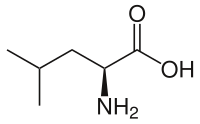
Photo from wikipedia
Aging is associated with sarcopenia and functional decline, leading to frailty and disability. As a modifiable risk factor, nutrition may represent a target for preventing or postponing the onset of… Click to show full abstract
Aging is associated with sarcopenia and functional decline, leading to frailty and disability. As a modifiable risk factor, nutrition may represent a target for preventing or postponing the onset of these geriatric conditions. Among nutrients, high-quality protein, leucine, vitamin D, and omega-3 polyunsaturated fatty acids (n-3 PUFA) are of particular interest for their demonstrated effects on skeletal muscle health. This narrative review aims to examine the recent observational and interventional evidence on the associations and the role of these nutrients in the muscle mass, strength, mobility, and physical function of free-living older adults, who are either healthy or at risk of frailty. Recent evidence supports a higher protein intake recommendation of 1.0–1.2 g/kg/day in healthy older adults; an evenly distributed mealtime protein intake or minimal protein per meal may be beneficial. In addition, vitamin D supplementation of 800–1000 IU, particularly when vitamin D status is low, and doses of ~3 g/day of n-3 PUFA may be favorable for physical function, muscle mass, and strength. Reviewed studies are highly heterogenous, yet the quantity, quality, and timing of intakes should be considered when designing intervention studies. Combined protein, leucine, vitamin D, and n-3 PUFA supplements may convey added benefits and may represent an intervention strategy in the prevention of sarcopenia and functional decline.
Journal Title: Nutrients
Year Published: 2018
Link to full text (if available)
Share on Social Media: Sign Up to like & get
recommendations!